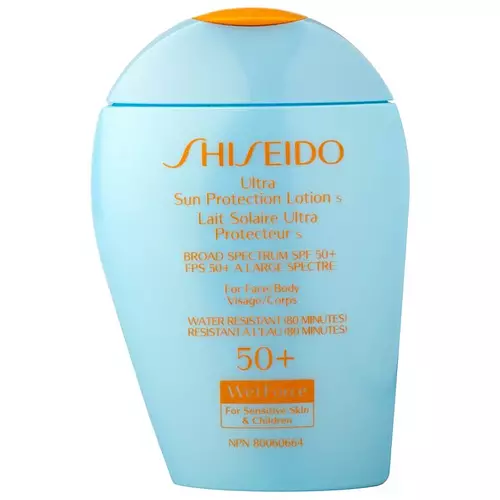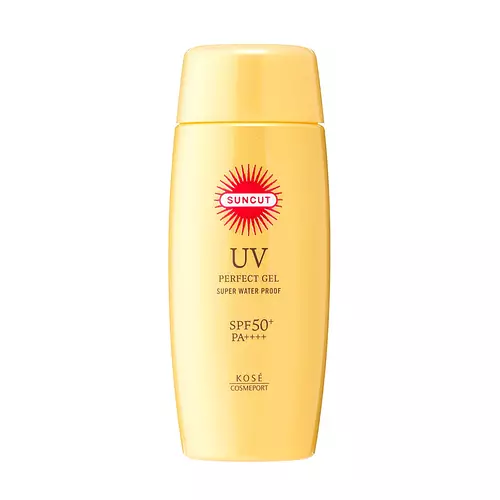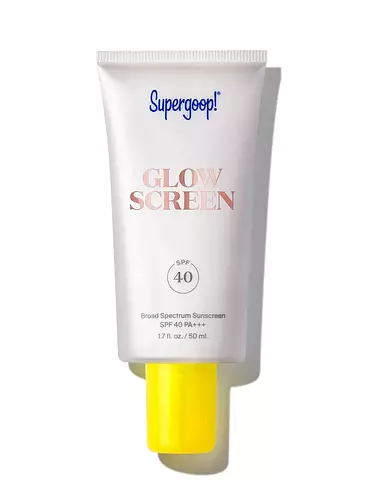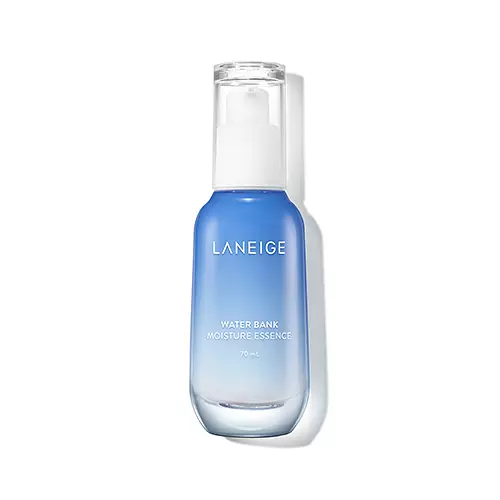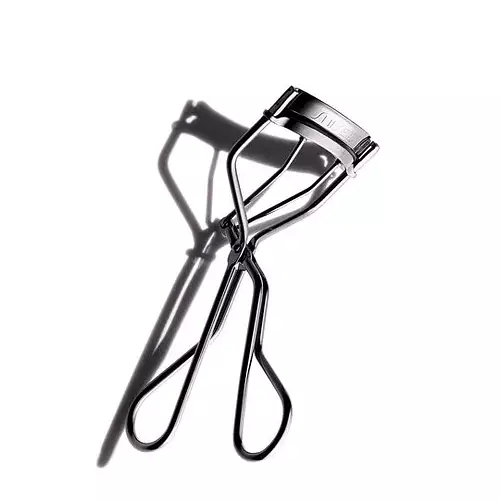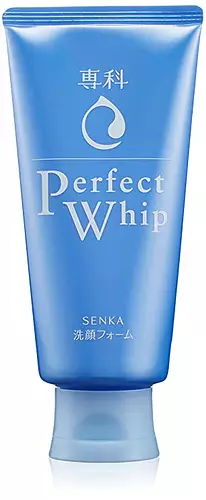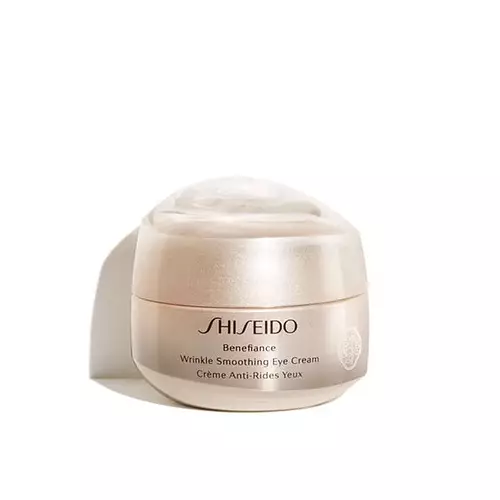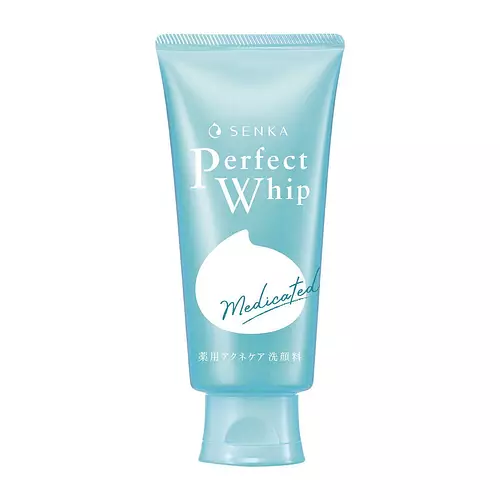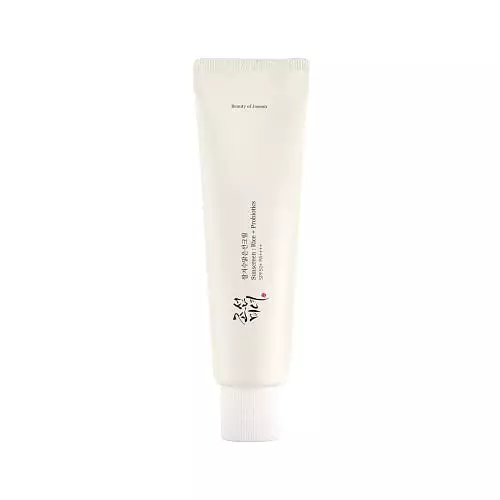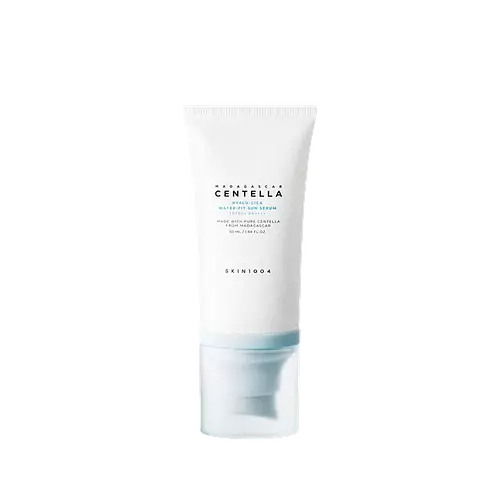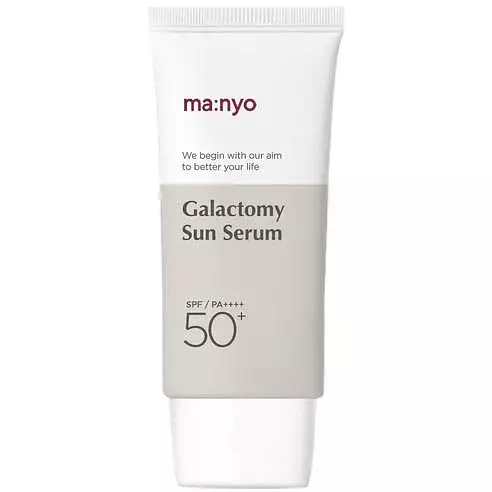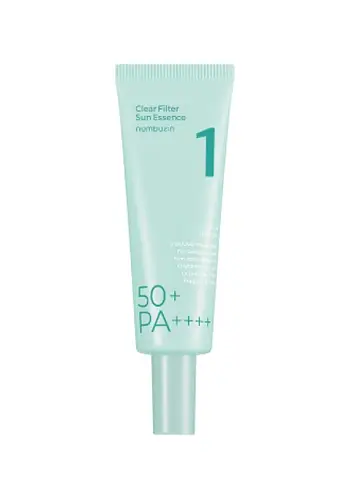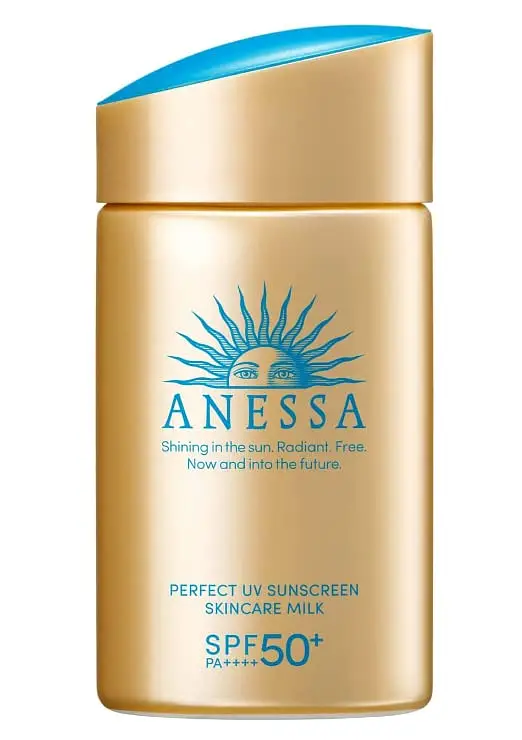
Shiseido Anessa Perfect UV Sunscreen Skincare Milk SPF 50+ Ingredients Explained
Updated June 4, 2024 •
There is an older formulation of this product:
Overview
What it is
Sunscreen with 48 ingredients that contains exfoliants, hyaluronic acid, SPF and Vitamin E
Suited For
It has ingredients that are good for fighting acne, anti aging, dry skin, brightening skin, sensitive skin, reducing pores, scar healing and dark spots
Free From
It doesn't contain any common allergens, oils, parabens or sulfates
Fun facts
Shiseido is from Japan. This product is used in 83 routines created by our community.
We independently verify ingredients and our claims are backed by peer-reviewed research. Does this product need an update? Let us know.
Sunscreen with 48 ingredients that contains exfoliants, hyaluronic acid, SPF and Vitamin E
Quick info
You should know
Notable Ingredients
This product contains 6 ingredients that may have this attribute:
This product contains 2 ingredients that may have this attribute:
This product contains 1 ingredient that may have this attribute:
This product contains 3 ingredients that may have this attribute:
This product contains 1 ingredient that may have this attribute:
Benefits
This product contains 2 ingredients that may have this attribute:
This product contains 2 ingredients that may have this attribute:
This product contains 2 ingredients that may have this attribute:
This product contains 1 ingredient that may have this attribute:
This product contains 3 ingredients that may have this attribute:
This product contains 1 ingredient that may have this attribute:
This product contains 1 ingredient that may have this attribute:
This product contains 2 ingredients that may have this attribute:
This product contains 2 ingredients that may have this attribute:
Concerns
This product contains 2 ingredients that may have this attribute:
This product contains 3 ingredients that may have this attribute:
This product contains 3 ingredients that may have this attribute:
This product contains 2 ingredients that may have this attribute:
This product contains 5 ingredients that may have this attribute:
This product contains 4 ingredients that may have this attribute:
Ingredients 48
Dimethicone is a silicone used for making products smooth and silky. It also has the added benefit of sealing in hydration. The amount of dimethicone found in beauty products is considered safe and non-comedogenic, meaning it won't clog pores.
Water. It's the most common cosmetic ingredient of all. You'll usually see it at the top of ingredient lists, meaning that it makes up the largest part of the product.
Zinc Oxide is a mineral broad-spectrum UV filter; it is the broadest UVA and UVB reflector approved by the FDA. While it is most commonly man-made for cosmetics, it can naturally occur in zincite, a rare mineral.
Alcohol comes in many different forms. Different types of alcohol will have different effects on skin. This ingredient is usually an astringent alcohol.
Talc is a clay mineral. It helps absorb moisture and improve the texture of products. Like other types of clay, Talc can have a slight exfoliating effect on skin. Talc can be added to increase the volume of products.
Octocrylene protects skin from sun damage. It absorbs UV-B with peak absorption of 304 nm. It is a common sunscreen ingredient and often paired with avobenzone, a UVA filter. This is because octocrylene stabilizes other sunscreen ingredients by protecting them from degradation when exposed to sunlight. Octocrylene is a photostable ingredient and loses about 10% of SPF in 95 minutes.
Ethylhexyl Salicylate is an organic compound used to block UV rays. It primarily absorbs UVB rays but offers a small amount of UVA protection as well.
C12-15 Alkyl Benzoate is made up of Benzoic Acid and long chain alcohols. It has a low molecular weight.
Zea Mays Starch is starch made from corn. You might know this as cornstarch . It is used to thicken a product. It can replace talc as an absorbent.
Silica is a mineral naturally found in our skin. It helps to thicken and smooth the texture of a product. It also acts as an agent for other ingredients by increasing the absorption of other ingredients into the skin.
Isopropyl Myristate is an emollient, thickening agent, and texture enhancer. It is created from isopropyl alcohol and myristic acid.
Diethylamino Hydroxybenzoyl Hexyl Benzoate (DHHB) is a chemical UVA absorber. It is formulated for high UVA protection (320-400 nm).
Titanium dioxide is known for its UVA and UVB protection properties. It is non-comedogenic and non-irritating. Titanium Dioxide is a physical sunscreen. Physical sunscreens reflect light and prevent it from reaching your skin.
Peg-9 Polydimethylsiloxyethyl Dimethicone is a type of silicone.
Dextrin Palmitate comes from the palmitic acid ester of Dextrin. It is used as an emulsifier and texture enhancer.
Glycerin is already naturally found in your skin. It helps moisturize and protect your skin.
Homosalate is a chemical sunscreen filter that provides protection in the UV-B range (280nm - 320 nm), with a peak protection at 306 nm. It is internationally approved for use in sunscreens.
Ethylhexyl Triazone is a modern chemical sunscreen that protects from UV-B radiation.
You might know this ingredient as Tinosorb S or Bemotrizinol. It is a UV filter that covers both UVA and UVB rays.
Peg-10 Dimethicone is silicone with conditioner and emulsifier properties. It mostly acts as an emollient in skincare and and humectant in haircare.
Isostearic acid is a saturated fatty acid. Its structure makes it a great surfactant.
Triethoxycaprylylsilane is a silicone used to bind and stabilize ingredients.
Disteardimonium Hectorite comes from the clay mineral named hectorite. It is used to add thickness to a product.
Aluminum Hydroxide is a form of aluminum. It can be naturally found in nature as the mineral gibbsite. In cosmetics, Aluminum Hydroxide is used as a colorant, pH adjuster, and absorbent.
Stearic Acid is a fatty acid. It is an emollient, emulsifier, and texture enhancer.
Chances are, you eat sodium chloride every day. Sodium Chloride is also known as table salt.
Parfum is a catch-all term for an ingredient or more that is used to give a scent to products.
Tocopherol (also known as Vitamin E) is a common antioxidant used to help protect the skin from free-radicals and strengthen the skin barrier. It's also fat soluble - this means our skin is great at absorbing it.
BHT is a synthetic antioxidant. As an antioxidant, it helps your body fight off free-radicals. Free-radicals are molecules that may damage your skin cells.
Butylene Glycol (or BG) is used within cosmetic products for a few different reasons:
Sodium Metabisulfite is an antioxidant and is a preservative.
Camellia Sinensis Leaf Extract is derived from the leaves of the tea plant. Black tea, green tea, and oolong tea are all harvested from this plant.
Citric Acid is an AHA derived from citrus fruits (think oranges, lemons, and limes!).
Sodium Citrate is the sodium salts of citric acid. In skincare, it is used to alter pH levels and acts as a preservative.
Synthetic Fluorphlogopite is the synthethic version of mica. It consists of fluorine, aluminum and silicate.
Triethoxysilylethyl Polydimethylsiloxyethyl Dimethicone is a type of silicone.
Soluble Collagen can help to reduce the effects of aging.
Phenoxyethanol is a preservative that has germicide, antimicrobial, and aromatic properties. Studies show that phenoxyethanol can prevent microbial growth. By itself, it has a scent that is similar to that of a rose.
Dimethicone, Water, Zinc Oxide 10.35%, Alcohol, Talc, Isododecane, Diisopropyl Sebacate, Octocrylene 5%, Ethylhexyl Salicylate 4.9%, C12-15 Alkyl Benzoate, Peg-8, Zea Mays Starch, Silica, Isopropyl Myristate, Diethylamino Hydroxybenzoyl Hexyl Benzoate 1.8%, Titanium Dioxide, Peg-9 Polydimethylsiloxyethyl Dimethicone, Dextrin Palmitate, Glycerin, Homosalate 1%, Ethylhexyl Triazone 0.8%, Polysilicone-15 0.5%, Bis-Ethylhexyloxyphenol Methoxyphenyl Triazine 0.5%, Peg-10 Dimethicone, Isostearic Acid, Triethoxycaprylylsilane, Disteardimonium Hectorite, Aluminum Hydroxide, Stearic Acid, Trisodium EDTA, Sodium Chloride, Peg-6, Parfum, Tocopherol, BHT, Butylene Glycol, Sodium Metabisulfite, Saccharide Isomerate, Dipotassium Glycyrrhizate, Camellia Sinensis Leaf Extract, Potentilla Erecta Root Extract, Citric Acid, Sodium Citrate, Sodium Acetylated Hyaluronate, Synthetic Fluorphlogopite, Triethoxysilylethyl Polydimethylsiloxyethyl Dimethicone, Soluble Collagen, Phenoxyethanol
Ingredient Ratings
Based on the number of likes and dislikes each ingredient has received.
Ingredients Explained
Dimethicone is a silicone used for making products smooth and silky. It also has the added benefit of sealing in hydration. The amount of dimethicone found in beauty products is considered safe and non-comedogenic, meaning it won't clog pores.
Dimethicone has been found increase absorption in skin, boosting the benefits of other ingredients. While there is concern for the safety of dimethicone, the levels used in skincare are safe for use.
Water. It's the most common cosmetic ingredient of all. You'll usually see it at the top of ingredient lists, meaning that it makes up the largest part of the product.
So why is it so popular? Water most often acts as a solvent - this means that it helps dissolve other ingredients into the formulation.
You'll also recognize water as that liquid we all need to stay alive. If you see this, drink a glass of water. Stay hydrated!
Learn more about WaterZinc Oxide is a mineral broad-spectrum UV filter; it is the broadest UVA and UVB reflector approved by the FDA. While it is most commonly man-made for cosmetics, it can naturally occur in zincite, a rare mineral.
Today, traditional and nano-sized zinc oxide can be found in beauty products. Nano-sized zinc oxide can enhance a product's UV protection. While it is not believed to have a negative effect on skin, nano-zinc oxide can be harmful to coral reefs.
More about harmful reef ingredients here.
Zinc Oxide also has antibacterial and calming properties. It is not water soluble.
Zinc has been used throughout history as an ingredient in paint and medicine. An Indian text from 500BC is believed to list zinc oxide as a salve for open wound. The Ancient Greek physician Dioscorides has also mentioned the use of zinc as an ointment in 1AD.
Learn more about Zinc OxideAlcohol comes in many different forms. Different types of alcohol will have different effects on skin. This ingredient is usually an astringent alcohol.
These alcohols are drying on the skin. They may strip away your skin's natural oils and even damage your skin barrier. Astringent alcohols may also irritate skin.
Other types of astringent alcohols include:
According to the National Rosacea Society based in the US, you should be mindful of products with these alcohols in the top half of ingredients.
Any type of sanitizing product will have high amounts of alcohol to help kill bacteria and viruses.
Fatty alcohols come from plant oils such as coconut oil. These can help hydrate the skin and are non-irritating. Some fatty alcohols include cetyl and stearyl alcohol.
Learn more about AlcoholTalc is a clay mineral. It helps absorb moisture and improve the texture of products. Like other types of clay, Talc can have a slight exfoliating effect on skin. Talc can be added to increase the volume of products.
Some Baby powders are made by combining talc with corn starch. The word "talc" comes from Latin and originates from Arabic. Talc is a mineral commonly found throughout the world.
If you have any concerns about using talc, we recommend checking out the FDA's official page.
Learn more about TalcIsododecane is a fragrance, emollient, and solvent.
As an emollient, it helps your skin stay soft and hydrated. Emollients help trap moisture into your skin.
Isododecane's role as a solvent makes it a great texture enhancer. It spreads smoothly on skin and does not leave a sticky feeling behind. Isododecane also helps prevent color transfer in makeup products.
Isododecane is not absorbed into skin.
Learn more about IsododecaneWe don't have a description for Diisopropyl Sebacate.
Octocrylene protects skin from sun damage. It absorbs UV-B with peak absorption of 304 nm. It is a common sunscreen ingredient and often paired with avobenzone, a UVA filter. This is because octocrylene stabilizes other sunscreen ingredients by protecting them from degradation when exposed to sunlight. Octocrylene is a photostable ingredient and loses about 10% of SPF in 95 minutes.
Octocrylene also acts as an emollient, meaning it helps skin retain moisture and softens skin. It is oil-soluble and hydrophobic, enhancing water-resistant properties in a product.
Those who are using ketoprofen, a topical anti-inflammatory drug, may experience an allergic reaction when using octocrylene. It is best to speak with a healthcare professional about using sunscreens with octocrylene.
The EU allows a maximum of these concentrations:
Learn more about OctocryleneEthylhexyl Salicylate is an organic compound used to block UV rays. It primarily absorbs UVB rays but offers a small amount of UVA protection as well.
Commonly found in sunscreens, Ethylhexyl Salicylate is created from salicylic acid and 2-ethylhexanol. You might know salicylic acid as the effective acne fighter ingredient and BHA.
The ethylhexanol in this ingredient is a fatty alcohol and helps hydrate your skin, similar to oils. It is an emollient, which means it traps moisture into the skin.
According to manufacturers, Ethylhexyl Salicylate absorbs UV wavelength of 295-315 nm, with a peak absorption at 307-310 nm. UVA rays are linked to long term skin damage, such as hyperpigmentation. UVB rays emit more energy and are capable of damaging our DNA. UVB rays cause sunburn.
Learn more about Ethylhexyl SalicylateC12-15 Alkyl Benzoate is made up of Benzoic Acid and long chain alcohols. It has a low molecular weight.
C12-15 Alkyl Benzoate is an emollient and texture enhancer. Due to its solubility, it is often used in sunscreens to help evenly distribute active ingredients.
As an emollient, C12-15 Alkyl Benzoate helps soften and hydrate your skin. Emollients create a film on your skin that traps moisture within.
This ingredient has been reported to cause eye irritation.
Learn more about C12-15 Alkyl BenzoatePEG-8 is a synthetic polymer used as a humectant and solvent.
This ingredient is able to help dissolve active ingredients, including water. This gives it humectant properties.
It is soluble in water. The number '8' stands for the molecular weight of the ingredient.
Learn more about Peg-8Zea Mays Starch is starch made from corn. You might know this as cornstarch . It is used to thicken a product. It can replace talc as an absorbent.
The pH of cornstarch is 5.92.
Cornstarch is a common food ingredient used to thicken soups or to make corn syrup.
Learn more about Zea Mays StarchSilica is a mineral naturally found in our skin. It helps to thicken and smooth the texture of a product. It also acts as an agent for other ingredients by increasing the absorption of other ingredients into the skin.
Silica is often used for absorption and can help reduce shine when products are applied. Silica occurs in naturally in materials like clay and sandstone, and it can also be produced synthetically.
Silica is present naturally within the skin during collagen production and when reducing inflammation.
Learn more about SilicaIsopropyl Myristate is an emollient, thickening agent, and texture enhancer. It is created from isopropyl alcohol and myristic acid.
It is used to help other ingredients be better absorbed. It is also an emollient and may help soften and hydrate the skin.
The comedogenic rating of this ingredient depends on the concentration. Lower amounts results in a lower rating.
Isopropyl Myristate may not be fungal acne safe. It can potentially worsen acne prone skin.
Learn more about Isopropyl MyristateDiethylamino Hydroxybenzoyl Hexyl Benzoate (DHHB) is a chemical UVA absorber. It is formulated for high UVA protection (320-400 nm).
DHHB is well-liked for:
DHHB has been approved by the EU, Japan, Taiwan, and South America for use up to 10%. Unfortunately, it has not been approved for use in the US or Canada due to slow regulatory processes.
This ingredient is soluble in oils, fats, and lipids.
It is an UV absorber. UV absorbers are an agent that absorbs UV rays to protect your skin. They use chemical reactions to convert UV rays into heat and energy.
Learn more about Diethylamino Hydroxybenzoyl Hexyl BenzoateTitanium dioxide is known for its UVA and UVB protection properties. It is non-comedogenic and non-irritating. Titanium Dioxide is a physical sunscreen. Physical sunscreens reflect light and prevent it from reaching your skin.
Protecting your skin against UV radiation can prevent the signs of aging. Sun damage is associated with fine-lines, wrinkles, loss of firmness, and hyperpigmentation. Titanium dioxide can help prevent premature aging.
With modern production, nano-scale or fine-grade titanium dioxide can be easily produced for cosmetics. In sunscreen, titanium dioxide absorbs UV light. Our skin is not able to absorb Titanium dioxide, even nanoparticles.
Titanium itself is the 9th most common element in the Earth's crust. Titanium dioxide is formed when oxygen is introduced and can be found in ores, dust, sand, and soil.
Pure titanium dioxide is a white powder that is used in many products to add or change color.
Learn more about Titanium DioxidePeg-9 Polydimethylsiloxyethyl Dimethicone is a type of silicone.
Dextrin Palmitate comes from the palmitic acid ester of Dextrin. It is used as an emulsifier and texture enhancer.
Emulsifiers help keep ingredients together. According to a manufacturer, dextrin palmitate helps create a low-viscosity gel texture.
Due to its fatty acid base, this ingredient is not fungal-acne safe.
Learn more about Dextrin PalmitateGlycerin is already naturally found in your skin. It helps moisturize and protect your skin.
A study from 2016 found glycerin to be more effective as a humectant than AHAs and hyaluronic acid.
As a humectant, it helps the skin stay hydrated by pulling moisture to your skin. The low molecular weight of glycerin allows it to pull moisture into the deeper layers of your skin.
Hydrated skin improves your skin barrier; Your skin barrier helps protect against irritants and bacteria.
Glycerin has also been found to have antimicrobial and antiviral properties. Due to these properties, glycerin is often used in wound and burn treatments.
In cosmetics, glycerin is usually derived from plants such as soybean or palm. However, it can also be sourced from animals, such as tallow or animal fat.
This ingredient is organic, colorless, odorless, and non-toxic.
Glycerin is the name for this ingredient in American English. British English uses Glycerol/Glycerine.
Learn more about GlycerinHomosalate is a chemical sunscreen filter that provides protection in the UV-B range (280nm - 320 nm), with a peak protection at 306 nm. It is internationally approved for use in sunscreens.
Homosalate is not photo-stable, meaning it's strength as a UV filter degrades over time with exposure to the sun. Because of this, it's often used in combination with other chemical sunscreen filters as avobenzone (which protects from the UV-A range). Homosalate also helps act as a solvent for harder-to-dissolve UV filters.
(Part of the reason that sunscreens need to be frequently re-applied is due to the photo instability of many chemical sunscreen filters)
Currently, homosalate is approved in concentrations up to 10% in the EU and 15% in the US. The FDA is currently doing further research on the effects of homosalate, and it is possible that these approved concentrations will change in the future.
Learn more about HomosalateEthylhexyl Triazone is a modern chemical sunscreen that protects from UV-B radiation.
It is the most effective of existing UV-B filters, as it provides the highest level of photo-stable absorption. It protects from the entire UV-B range (280 to 320nm), with it's highest level of protection at 314nm.
Ethylhexyl Triazone is oil soluble, oderless and colorless, which mean it is able to be incorporated into a variety of different formulations.
It is not currently available within the United States due to slow changing FDA regulations. Outside of the US, it is used in formulations at concentrations up to 5%.
Learn more about Ethylhexyl TriazoneWe don't have a description for Polysilicone-15.
You might know this ingredient as Tinosorb S or Bemotrizinol. It is a UV filter that covers both UVA and UVB rays.
Bemotrizinol has two peak UV absorption peaks ( 310 and 340 nm) and is able to absorb both UV-A and UV-B rays. Skin exposed to UV causes free-radical molecules to form. This ingredient works by preventing the UV from reaching your skin.
It is highly photostable and helps prevent the photodegration of other sunscreen ingredients such as avobenzone.
Bemotrizinol is not approved in the US but is allowed in the EU, Australia, and Asia.
In fact, it is the most effective UV absorber at maximum concentration (measured by SPF) permitted by in the EU.
It is oil-soluble.
Learn more about Bis-Ethylhexyloxyphenol Methoxyphenyl TriazinePeg-10 Dimethicone is silicone with conditioner and emulsifier properties. It mostly acts as an emollient in skincare and and humectant in haircare.
According to the manufacturer, acidic formulations decrease the stability of this ingredient. It works best in neutral or near neutral formulations.
Isostearic acid is a saturated fatty acid. Its structure makes it a great surfactant.
Surfactants help decrease the surface tension between two liquids. This property also makes it an effective emulsifier. Emulsifiers help prevent waters and oils from separating in a product.
Isostearic Acid is created from oleic acid.
This ingredient may not be Malassezia folliculitis, or fungal-acne safe.
Learn more about Isostearic AcidTriethoxycaprylylsilane is a silicone used to bind and stabilize ingredients.
As an emulsifier, it helps prevent ingredients from separating. This can help elongate the shelf life of products.
Triethoxycaprylylsilane is often used to coat mineral sunscreens ingredients to help give a better feel. It also helps reduce oxidative stress in sunscreens.
Learn more about TriethoxycaprylylsilaneDisteardimonium Hectorite comes from the clay mineral named hectorite. It is used to add thickness to a product.
It can also help stabilize a product by helping to disperse other ingredients.
Hectorite is a rare, white clay mineral.
Learn more about Disteardimonium HectoriteAluminum Hydroxide is a form of aluminum. It can be naturally found in nature as the mineral gibbsite. In cosmetics, Aluminum Hydroxide is used as a colorant, pH adjuster, and absorbent.
As a colorant, Aluminum Hydroxide may add opacity, or reduce the transparency. Aluminum hydroxide is contains both basic and acidic properties.
According to manufacturers, this ingredient is an emollient and humectant. This means it helps hydrate the skin.
In medicine, this ingredient is used to help relieve heartburn and help heal ulcers.
Learn more about Aluminum HydroxideStearic Acid is a fatty acid. It is an emollient, emulsifier, and texture enhancer.
As an emollient, stearic acid helps soften skin. It aids the skin's protective barrier by preventing water loss. It also provides a gentle cleansing effect without stripping away natural oils.
Stearic acid may also be used to enhance the texture of products. It can add volume and stabilize ingredients such as water and oil. This can help water and oil ingredients from separating.
Sources of stearic acid include animal or vegetable fats/oils such as coconut or shea. It can be naturally found in butter, cocoa butter, shea butter, vegetable fats, and animal tallow.
This ingredient may not be Malassezia folliculitis, or fungal-acne safe.
Learn more about Stearic AcidWe don't have a description for Trisodium EDTA.
Chances are, you eat sodium chloride every day. Sodium Chloride is also known as table salt.
This ingredient has many purposes in skincare: thickener, emulsifier, and exfoliator.
You'll most likely find this ingredient in cleansers where it is used to create a gel-like texture. As an emulsifier, it also prevents ingredients from separating.
There is much debate on whether this ingredient is comedogenic. The short answer - comedogenic ratings don't tell the whole story. Learn more about comegodenic ratings here.
The concensus about this ingredient causing acne seems to be divided. Research is needed to understand if this ingredient does cause acne.
Scrubs may use salt as the primary exfoliating ingredient.
Learn more about Sodium ChlorideWe don't have a description for Peg-6.
Parfum is a catch-all term for an ingredient or more that is used to give a scent to products.
Also called "fragrance", this ingredient can be a blend of hundreds of chemicals or plant oils. This means every product with "fragrance" or "parfum" in the ingredients list is a different mixture.
In the US, the alternative name for parfum is 'fragrance'.
The term 'fragrance' is not regulated in many countries. In many cases, it is up to the brand to define this term.
For instance, many brands choose to label themselves as "fragrance-free" because they are not using synthetic fragrances. However, their products may still contain ingredients such as essential oils that are considered a fragrance by INCI standards.
One example is Calendula flower extract. Calendula is an essential oil that still imparts a scent or 'fragrance'.
Depending on the blend, the ingredients in the mixture can cause allergies and sensitivities on the skin. Some ingredients that are known EU allergens include linalool and citronellol.
Parfum can also be used to mask or cover an unpleasant scent.
The bottom line is: not all fragrances/parfum/ingredients are created equally. If you are worried about fragrances, we recommend taking a closer look at an ingredient. And of course, we always recommend speaking with a professional.
Learn more about ParfumTocopherol (also known as Vitamin E) is a common antioxidant used to help protect the skin from free-radicals and strengthen the skin barrier. It's also fat soluble - this means our skin is great at absorbing it.
Vitamin E also helps keep your natural skin lipids healthy. Your lipid skin barrier naturally consists of lipids, ceramides, and fatty acids. Vitamin E offers extra protection for your skin’s lipid barrier, keeping your skin healthy and nourished.
Another benefit is a bit of UV protection. Vitamin E helps reduce the damage caused by UVB rays. (It should not replace your sunscreen). Combining it with Vitamin C can decrease sunburned cells and hyperpigmentation after UV exposure.
You might have noticed Vitamin E + C often paired together. This is because it is great at stabilizing Vitamin C. Using the two together helps increase the effectiveness of both ingredients.
There are often claims that Vitamin E can reduce/prevent scarring, but these claims haven't been confirmed by scientific research.
Learn more about TocopherolBHT is a synthetic antioxidant. As an antioxidant, it helps your body fight off free-radicals. Free-radicals are molecules that may damage your skin cells.
BHT also helps stabilize products and prevent them from degrading. Many products are sensitive to air and light. BHT prevents them from breaking down when exposed.
Butylene Glycol (or BG) is used within cosmetic products for a few different reasons:
- It is a solvent, meaning that it helps to dissolve other ingredients. This also enhances the absorption of the product into one's skin.
- It is a humectant, which means that it helps attract moisture into the skin.
- It helps improve product application.
Overall, Butylene Glycol is a safe and well-rounded ingredient. It is unlikely to irritate skin, and works well with pretty much all other ingredients.
Sodium Metabisulfite is an antioxidant and is a preservative.
Saccharide Isomerate comes from sugars found in corn. It is a skin hydrator.
The structure of this ingredient can be altered to be more similar to the carbohydrates found in our skin. This ability to mimic our skin gives it hydrating properties.
Specifically, saccharide Isomerate is a humectant. Humectants draw moisture from the air to our skin.
Research shows Saccharide Isomerate to be an effective moisturizer.
Learn more about Saccharide IsomerateDipotassium Glycyrrhizate comes from licorice root.
Extracts of licorice have demonstrated to have antibacterial, anti‐inflammatory, antiviral, antioxidant properties.
One component, glabridin, has extra potent antioxidant and soothing properties. It has also been found to block pigmentation from UVB rays in guinea pigs.
Licorice Root also contains a flavonoid. Flavonoids are a natural substance from in plants. Flavonoids also have antioxidant properties.
Another component, glycyrrhizin, has been found to have anti-inflammatory and antimicrobial benefits. This may make licorice root extract effective at treating acne. However, more research is needed to support this.
Liquiritin is one of the flavone compounds found in licorice. It has been found to help lighten skin by preventing tyrosinase from reacting with tyrosine. When the two react, protein is converted to melanin. Melanin is the substance in your body that gives your features pigmentation.
Licorice root is native to Southern Europe and Asia. It has been used in traditional Chinese medicine to help with respiratory issues.
Learn more about Dipotassium GlycyrrhizateCamellia Sinensis Leaf Extract is derived from the leaves of the tea plant. Black tea, green tea, and oolong tea are all harvested from this plant.
This ingredient has many skin benefits:
This ingredient contains polyphenols, a strong antioxidant. Antioxidants help fight off molecules that damage skin cells.
On top of that, the antioxidants in green tea neutralize free-radicals from the sun. This gives the skin some extra UV protection, but should not replace sunscreen.
Many components of tea have anti-inflammatory properties.
Polyphenols and L-theanine help soothe the skin and reduce irritation. The caffeine in Camellia Sinensis Leaf Extract helps calm inflamed blood vessels.
Other compounds found in tea include: Vitamin Bs, linoleic acid, magnesium, calcium, iron, and zinc.
Research has shown both drinking Camellia Sinensis Leaf Tea and applying it to the skin can help boost skin elasticity and hydration. Studies also show using tea extract may reduce sebum, or oil, production.
Learn more about Camellia Sinensis Leaf ExtractWe don't have a description for Potentilla Erecta Root Extract.
Citric Acid is an AHA derived from citrus fruits (think oranges, lemons, and limes!).
As an AHA, Citric Acid removes the top layer of skin cells from the newer layer of skin underneath. This helps skin to remove dark spots and even out skin tone.
If you spot Citric Acid near the end of an ingredient list, it's likely there as a pH adjuster rather than an active ingredient.
Read more about some other popular AHA's here:
Learn more about Citric AcidSodium Citrate is the sodium salts of citric acid. In skincare, it is used to alter pH levels and acts as a preservative.
Sodium Citrate helps maintain the pH of a product. Normal pH level of skin is slightly acidic (~4.75-5.5). The acidity of our skin is maintained by our glands and skin biome. Being slightly acidic allows our skin to create an "acid mantle". This acid mantle is a thin barrier that protects our skin from bacteria and contaminants.
Sodium Citrate is a chelating agent. It neutralizes metal ions from water and prevents them from binding to other ingredients. This ensures the other ingredients will not be altered.
Learn more about Sodium CitrateSodium Acetylated Hyaluronate is a type of Hyaluronic Acid.
Hyaluronic Acids help moisturize, soothe, and protect the skin.
Read about common types of Hyaluronic Acid here: Sodium Hyaluronate Hydrolyzed Hyaluronic Acid Hyaluronic Acid
Learn more about Sodium Acetylated HyaluronateSynthetic Fluorphlogopite is the synthethic version of mica. It consists of fluorine, aluminum and silicate.
Synthetic Fluorphlogopite is used to add volume to products.
It is considered non-irritating on the skin.
Learn more about Synthetic FluorphlogopiteTriethoxysilylethyl Polydimethylsiloxyethyl Dimethicone is a type of silicone.
Soluble Collagen can help to reduce the effects of aging.
Phenoxyethanol is a preservative that has germicide, antimicrobial, and aromatic properties. Studies show that phenoxyethanol can prevent microbial growth. By itself, it has a scent that is similar to that of a rose.
It's often used in formulations along with Caprylyl Glycol to preserve the shelf life of products.
Compared With
Here are some products that it's often compared with
More Shiseido Products
See all Shiseido productsMore Sunscreens
See all sunscreensWe're dedicated to providing you with the most up-to-date and science-backed ingredient info out there.
The data we've presented on this page has been verified by a member of the SkinSort Team.
Read more about us

